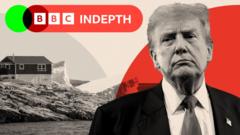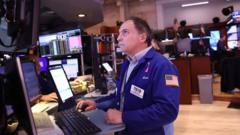Amid heightened worries of conflict, Taiwan's president emphasizes the importance of peace and democracy during his Pacific tour.
Taiwan President's Hawaii Visit Sparks Outrage in Beijing

Taiwan President's Hawaii Visit Sparks Outrage in Beijing
Lai Ching-te's trip to Hawaii intensifies scrutiny amid US-China tensions over Taiwan.
In a move that has raised eyebrows across the Pacific, Taiwanese President Lai Ching-te has commenced a two-day visit to Hawaii, prompting an intense backlash from Chinese authorities. Though the trip is categorized as a stopover amidst a broader Pacific tour, it arrives at a time of escalating tensions between the United States and China, particularly regarding Taiwan's sovereignty.
Upon his arrival in Hawaii, President Lai underscored his belief that "war has no winners," asserting that it is imperative to unite in efforts to avert conflict. In stark contrast, China's foreign ministry expressed its discontent, issuing a strong condemnation of the visit and formally protesting to the US government.
The historical backdrop of the Taiwan-China relationship is thick with conflict dating back to 1949, when Taiwan became self-governing after the Chinese Civil War. China has since regarded Taiwan as a breakaway region and actively opposes any international diplomatic engagement with it. The US maintains a complex position, refraining from formally recognizing Taiwan as an independent nation while fostering unofficial relationships with its leadership.
Prior to his departure, Lai articulated that the trip symbolizes "the beginning of a new era of value-based diplomacy" aimed at championing democracy, prosperity, and peace—hallmarks of Taiwanese society. He asserted his vision of Taiwan not only as a beacon of democracy but also as an essential player in driving global stability and prosperity.
During a ceremonial dinner attended by governmental officials, members of Congress, and members of the Taiwanese community in Hawaii, Lai reflected on a poignant visit to Pearl Harbor. The 1941 attack that drew the US into World War II served as a poignant reminder for him of the critical importance of fostering peace: "Peace is priceless, and war has no winners. We must fight together to prevent war," he declared.
Following his Hawaiian stop, President Lai plans to visit Marshall Islands, Tuvalu, and Palau, the only Pacific island nations recognizing Taiwan's independence. He will also make a brief stop in Guam, a US territory. Meanwhile, a spokesperson from China's defense ministry previously warned that China would categorically oppose any form of official interaction with Taiwan and expressed its determination to thwart any efforts towards Taiwanese independence.
As regional dynamics continue to shift, the implications of Lai's visit will likely reverberate throughout both Taiwan and China, setting the stage for further diplomatic challenges in the future.
Upon his arrival in Hawaii, President Lai underscored his belief that "war has no winners," asserting that it is imperative to unite in efforts to avert conflict. In stark contrast, China's foreign ministry expressed its discontent, issuing a strong condemnation of the visit and formally protesting to the US government.
The historical backdrop of the Taiwan-China relationship is thick with conflict dating back to 1949, when Taiwan became self-governing after the Chinese Civil War. China has since regarded Taiwan as a breakaway region and actively opposes any international diplomatic engagement with it. The US maintains a complex position, refraining from formally recognizing Taiwan as an independent nation while fostering unofficial relationships with its leadership.
Prior to his departure, Lai articulated that the trip symbolizes "the beginning of a new era of value-based diplomacy" aimed at championing democracy, prosperity, and peace—hallmarks of Taiwanese society. He asserted his vision of Taiwan not only as a beacon of democracy but also as an essential player in driving global stability and prosperity.
During a ceremonial dinner attended by governmental officials, members of Congress, and members of the Taiwanese community in Hawaii, Lai reflected on a poignant visit to Pearl Harbor. The 1941 attack that drew the US into World War II served as a poignant reminder for him of the critical importance of fostering peace: "Peace is priceless, and war has no winners. We must fight together to prevent war," he declared.
Following his Hawaiian stop, President Lai plans to visit Marshall Islands, Tuvalu, and Palau, the only Pacific island nations recognizing Taiwan's independence. He will also make a brief stop in Guam, a US territory. Meanwhile, a spokesperson from China's defense ministry previously warned that China would categorically oppose any form of official interaction with Taiwan and expressed its determination to thwart any efforts towards Taiwanese independence.
As regional dynamics continue to shift, the implications of Lai's visit will likely reverberate throughout both Taiwan and China, setting the stage for further diplomatic challenges in the future.






















